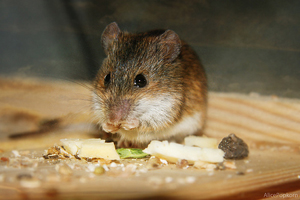 The gene CMAH is needed to induce human-like diabetes in mice. Image courtesy of AlicePopkorn.
The gene CMAH is needed to induce human-like diabetes in mice. Image courtesy of AlicePopkorn.
New research suggests that rodents and other mammals might not be ideal for studying type 2 diabetes because of a gene that was deleted from the human genome millions of years ago.
Virtually all mammals produce specific sugar molecules that aid cells in interacting with their environment. That is, all except humans. Around 2 to 3 million years ago humans lost CMAH, a gene that codes for an enzyme that produces the sugar Neu5Gc.
To test the role of this gene, researches compared two sets of mice. One group had a normal CMAH function and Neu5Gc production, the other group did not—just like humans. Both groups of mice were fed a diet that normally induces obesity and insulin resistance (metabolic syndrome), and both groups experienced these symptoms. However, only the mice missing the CMAH gene had lost the ability to produce insulin in the pancreas.
